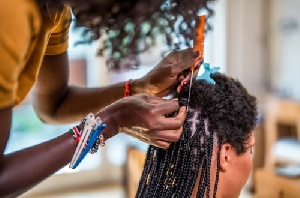
A recent investigation by Consumer Reports has found cancer-linked chemicals in synthetic hair products widely used in braids, weaves, and other protective hairstyles—raising serious concerns about the safety of items marketed primarily to Black women.
The study tested ten synthetic hair products and discovered that nine contained lead, a heavy metal known to cause developmental and reproductive harm. One product exceeded California’s maximum allowable lead limit by more than 600%. Since there are no federal standards for lead in synthetic hair, Consumer Reports relied on California’s more rigorous safety guidelines.
Popular brands like Magic Fingers, Sensationnel, and Shake-N-Go were among those flagged in the investigation. These companies use Kanekalon, a synthetic fiber often used in braiding hair. While Kaneka, the manufacturer of Kanekalon fibers, does not make finished hair products, it acknowledged the report and said more details were needed to fully assess the findings.
Synthetic hair is commonly used in protective styles like braids, twists, and locs—styles that can remain in place for weeks or even months, potentially extending exposure to any toxic ingredients present.
The report found that, beyond lead, some products contained benzene and methylene chloride—both known carcinogens. Benzene has been linked to acute myeloid leukemia, while methylene chloride is associated with liver and lung cancer. The U.S. Environmental Protection Agency has issued warnings about long-term exposure to both, and the Food and Drug Administration has banned methylene chloride from use in cosmetics entirely.
“There is no safe level of exposure for lead or benzene,” said Alexa Friedman of the Environmental Working Group (EWG). “These substances pose serious risks, and their presence in everyday hair products is deeply troubling.”
Despite the findings, manufacturers pushed back. Magic Fingers stated its products meet customer expectations for quality and performance. Sensationnel disputed the validity of the testing, arguing that the methods used did not reflect real-world product use. However, Consumer Reports conducted blind testing on 20 samples, all analyzed in a certified lab for heavy metal contamination.
The findings arrive amid growing scrutiny of the beauty industry’s impact on the health of Black women. In 2022, a class-action lawsuit was filed against chemical hair relaxer manufacturers, claiming the products caused uterine cancer. Scientific studies have shown elevated rates of reproductive cancers and infertility among women who use relaxers and other chemically intense beauty products marketed to women of color.
“These findings highlight a disturbing trend: toxic beauty products disproportionately target Black women,” Friedman said. “On average, women use about 12 personal care products every day, exposing them to a cocktail of potentially harmful chemicals.”
In response, the EWG created Skin Deep, a public database that evaluates the safety of over 4,000 beauty products, including many targeted at Black consumers. The goal is to provide transparency and empower individuals to make safer choices.
“Everyone deserves access to beauty products that won’t compromise their health,” Friedman added. “It’s time for manufacturers to prioritize safety over profits—and for regulators to step up.”





